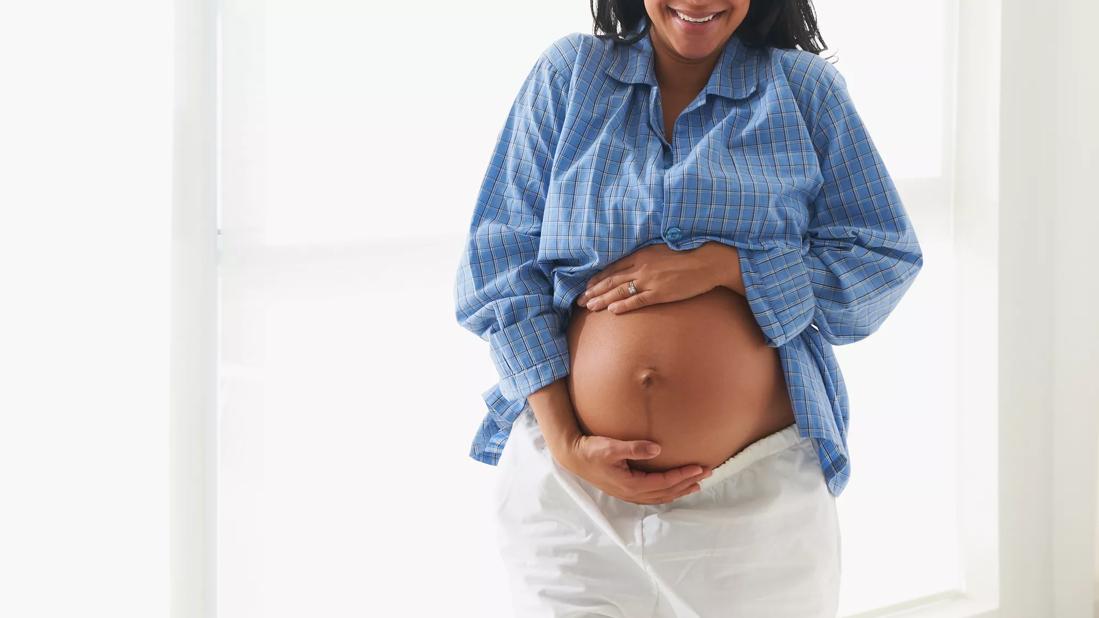When a growing fetus puts pressure on your abdomen, your belly button may pop out or even flatten

Image content: This image is available to view online.
View image online (https://assets.clevelandclinic.org/transform/7d81f0ad-6f03-4c05-90d7-89656b6e0dda/pregnant-belly-button-565536435)
Happy pregnant woman with hands around her belly, with belly button pushing out
Pregnancy can change your body in surprising ways, from swollen ankles to strange food cravings and beyond. But when you wake up one morning and realize that your “innie” belly button has become an “outie” overnight, you might be freaking out a little bit. What’s going on in there?!
Advertisement
Cleveland Clinic is a non-profit academic medical center. Advertising on our site helps support our mission. We do not endorse non-Cleveland Clinic products or services. Policy
Don’t panic: It’s totally normal for your belly button to pop during pregnancy, much like your belly itself does — and it won’t stay that way forever.
But a sudden outie isn’t the only possible belly button change that pregnancy can bring. Ob/Gyn Karmon James, MD, explains what you might experience, why it happens and perhaps most importantly, when you can expect it to go away.
“Everyone’s body — and every pregnancy — is different,” Dr. James says. Not everyone who’s pregnant will experience the same changes, issues and concerns, including those related to belly buttons. But here are two common possibilities:
Something else you might experience, regardless of what (if anything) happens to your belly button, is a dark line on your skin that extends from your belly button to your pubic area. This is called linea nigra, and like so many other things about pregnancy, it’s caused by an increase in hormones.
Advertisement
Nope. And there’s no telling whose belly button will turn outward and whose won’t.
“It doesn’t happen in every pregnancy,” Dr. James reiterates, “and there’s no rhyme or reason to who gets a popped-out belly button.”
There’s nothing you can do to anticipate it or prevent it either, so if you’re newly pregnant and haven’t seen any changes yet, you’ll just have to wait and see. When it comes to belly buttons, as with so much of life, que sera, sera — whatever will be, will be.
Whether your belly button pops out or flattens out during pregnancy, don’t worry about any lasting issues.
“It in no way indicates a problem,” Dr. James reassures, “and your belly button will likely return to normal after your pregnancy.” Linea nigra typically fades after you’ve given birth, too.
The belly button changes that pregnancy can bring shouldn’t come with any pain. But a stretched or flattened belly button may feel a little sore or tender, and an extended belly button can rub against your clothing, leading to irritation or itchiness.
“If your belly button becomes irritated from rubbing on your shirt or waistband, try covering it with a bandage or wearing a loose dress instead of pants,” Dr. James suggests.
It’s best not to apply any medications or topical ointments to your skin while you’re pregnant unless they’re specifically OK’d by your healthcare provider. If your belly button is bugging you, touch base to ask what they recommend.
Don’t ignore pain. If your belly button is causing more than just irritation or soreness, you may be experiencing a tissue bulge known as an umbilical hernia. It can develop when a sac from your small intestine pushes through an opening or weakness in your abdominal wall muscle.
“If your popped-out belly button is painful or there seems to be a bulging mass alongside your belly button, it’s time to see your doctor,” Dr. James advises.
Advertisement

Sign up for our Health Essentials emails for expert guidance on nutrition, fitness, sleep, skin care and more.
Learn more about our editorial process.
Advertisement
Most rashes aren’t dangerous — but it’s worth talking to your pregnancy provider about them
The best available evidence indicates that, used correctly, acetaminophen is safe to take throughout a pregnancy
Prenatal massage, done properly, is a safe and effective way to lower stress and relieve pregnancy discomforts
Avoid high-mercury fish and processed meat, and go easy on salt and caffeine
Unless your healthcare provider tells you otherwise, it’s typically considered safe to have sex during pregnancy
Hot tubs and saunas raise your body temperature and can pose risks
Baths can be safe if you turn down the temp, avoid irritating bath products and take extra precautions against
SSRIs are the safest antidepressants to take in pregnancy — and pose less risk than unmanaged depression
Although it could be used as a moisturizer, this new trend is not recommended
Communicating clear limits helps protect your time, energy and emotional well-being
High cholesterol can be genetic, but testing and treatment can lower your heart disease risk